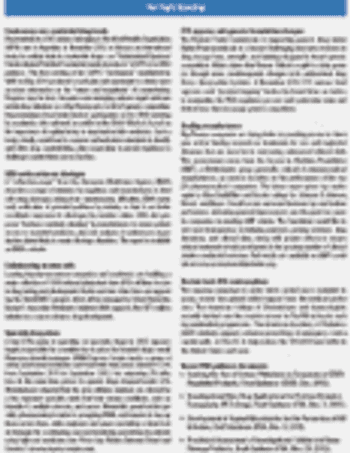
EU authorities are stepping up their efforts to incorporate QbD principles.

EU authorities are stepping up their efforts to incorporate QbD principles.

Discussions are underway as the pharmaceutical sector calls for greater consistency in the global monitoring of GMP compliance and quality testing of APIs and finished medicines.

Shortages spur efforts to overhaul manufacturing oversight.

FDA talks about the changing scope of regulatory science.

Shortages spur efforts to overhaul manufacturing oversight.

The management board of the European Medicines Agency (EMA) has endorsed the agency?s work programme and budget for 2013, which includes a budget of EUR231.6 million, a slight increase over 2012.

FDA has issued a draft guidance to assist applicants in the submission of summary-level clinical-site data.

Myriad Genetics reports that the US Supreme Court has granted certiorari agreeing to hear the company's gene patentability case.

USP revises labeling requirements for Heparin.

Will the next US President support the backbone of our industry?

The European Medicines Agency (EMA) has abolished its Cell-based Product Working Party (CPWP) and Gene Therapy Working Party (GTWP), with the aim of improving efficiencies and optimising the use of available expertise.

The European Generic Medicines Association (EGA) has raised concerns about the potential fees to be charged by the European Medicines Agency for pharmacovigilance activities

The European Medicines Agency has launched a public consultation concerning its inventory of paediatric medicines with the aim of highlighting where further R&D efforts are required. The consultation is the first of its kind in this area.

Import controls and risk strategies aim to promote quality and spur new drug development.

FDA Updates List of Warning Letters

How to handle and respond to a consent decree.

Has the long-awaited guidance answered all of the industry's questions?

More collaboration and expanded oversight aim to compel manufacturers to follow GMPs.

In a Warning Letter, FDA cited ?significant violations? of CGMP regulations, including several repeat observations, at three Novartis facilities. The violations included failure to prevent microbiological contamination of sterile drug products, failure to investigate out-of-specification batches, failure to clean and maintain equipment, and failure to ensure drugs? identity, strength, quality, and purity.

Rising imports, overseas production spur collaboration and realignment of enforcement activities.

Follow-on versions of complex biologics require extensive expertise.

The US Food and Drug Administration has designated XOMA 052, an antibody to interleukin-1 beta manufactured by XOMA, Ltd. (Berkley, CA), an orphan drug for the treatment of Behcet's disease.

Regulatory relief requires that regulators trust companies to know what they are doing, and to do it-consistently.

International outsourcing and rising theft spur regulatory action and manufacturer oversight.

The FDA is expanding postmarketing safety requirements, despite limited resources to manage these added responsibilities.